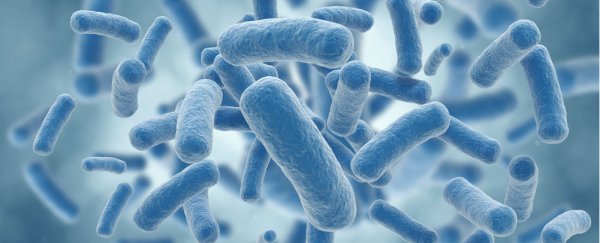Bacteria engineered to produce hunger suppressing molecules have been used to prevent mice from overeating, and could one day be used to help people lose weight, researchers say.
Pharmacologists from Vanderbilt University in the US have programmed a strain of E. coli, which is prescribed as a digestive probiotic in Europe, to produce a compound called N-acyl-phosphatidylethanolamines - or NAPE.
This compound is produced naturally in the small intestine following a meal, and is converted to a form that acts as an appetite suppressant, basically telling our bodies to stop eating. However, people who are obese sometimes don't produce enough of this compound, says lead researcher Sean Davis, which can make effective long-term treatment very difficult.
Davis hopes that by modifying bacteria to secrete certain therapeutic compounds, he can help treat diseases related to obesity and ageing, such as diabetes and heart disease. Importantly, this could also help eliminate the need to remember to take medication.
Davis and his team examined the effects of the genetically modified bacteria on mice that were fed a high-fat diet. Mice that drank water laced with the bacteria gained 15 percent less weight than mice in a control group over an eight-week treatment period.
These mice ate less food, had lower body fat, and staved off diseases such as diabetes and fatty liver disease, better than their counterparts. Furthermore, the researchers report that the beneficial effects of the bacteria lasted for about four to six weeks, which suggests that the microbes were able to colonise in the gut once ingested.
Davis presented his findings at the American Chemical Society spring meeting and addressed questions about the research at a press conference in the below video.

In earlier work, the team learned that mice needed to be able to convert the NAPE compound into an active metabolite in order for the ingested bacteria to prevent weight gain. This was problematic, as some mice lacked the enzyme needed to trigger this conversion, rendering the bacteria ineffective.
"But we could overcome that by further engineering our bacteria so they had that enzyme… and then, even in the mice that lacked the enzyme, we were able to inhibit the obesity," explained Davis.
As Katherine Bourzac at MIT Technology Review points out, bacteria have a distinct advantage for delivering certain compounds, such as NAPE, which cannot be administered orally because it wouldn't survive digestion.
Other teams are working on ways to deliver the compound, but Davis says this will likely require an injection - and perhaps several per day to achieve the same effect.
He says his team noticed that they need much less of the compound when it's being delivered by the bacteria, versus an injection, which he suspects is due to the fact that the bacteria are very close to the site where the NAPE needs to act.
"One of the advantages of the bacteria is that, particularly if we can get them to colonise, is that a person wouldn't have to take a drug everyday," he says. "In fact, they might not have to take it for many months at a time."
Concerns have been raised about contamination, with genetically engineered microbes escaping into the broader world around us. Davis acknowledged the concern, and said his group is trying to "cripple the bacteria" in a way that limits their potential to survive outside the warm, nutrient-rich environment of the gut.
Charles Elson, a gastroenterologist at the University of Alabama Medical School, told Bourzac at MIT Technology Review that using so-called 'designer probiotics' to treat chronic diseases is a promising idea.
However, Elson noted that it will be challenging to engineer therapeutic bacteria that can successfully establish a population in the human gut.
"The resident organisms in the gut will fight them off," he says.
Source: MIT Technology Review
